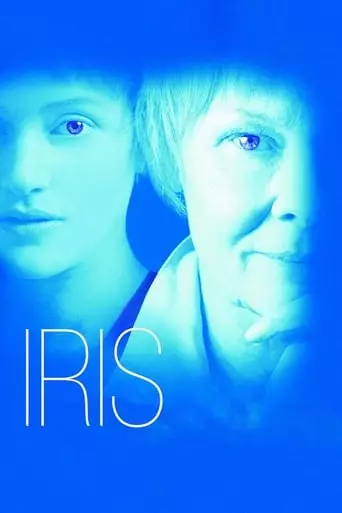True story of the lifelong romance between novelist Iris Murdoch and her husband John Bayley, from their student days through her battle with Alzheimer’s disease.
Iris is a 2001 biographical drama directed by Richard Eyre, chronicling the life of British author and philosopher Iris Murdoch. The film juxtaposes two periods of Murdoch’s life: her vibrant early years as a promising writer and her later years battling Alzheimer’s disease. The narrative intertwines these timelines, highlighting her enduring relationship with her husband, John Bayley.
In her youth, Iris (Kate Winslet) is portrayed as an intellectually formidable and free-spirited individual, captivating those around her, including the shy and reserved John Bayley (Hugh Bonneville). Their relationship evolves from friendship to a deep, albeit unconventional, marriage. As Iris’s career flourishes, she becomes a prominent figure in the literary world.
Decades later, the film shifts to Iris’s later years, where she is portrayed by Judi Dench. Now afflicted with Alzheimer’s disease, Iris’s cognitive decline profoundly impacts her and those around her. John (Jim Broadbent) becomes her primary caregiver, navigating the challenges of her memory loss and the strain it places on their relationship. The film poignantly captures the contrast between Iris’s former intellectual prowess and her current vulnerability, emphasizing the devastating effects of dementia.
Main Themes
- Love and Commitment
The film delves into the complexities of love and commitment, illustrating how John Bayley’s unwavering devotion to Iris endures despite the challenges posed by her illness. Their relationship exemplifies unconditional love, highlighting the sacrifices and resilience required to maintain a bond through life’s trials.
- Intellectualism and Identity
Iris’s identity is deeply intertwined with her intellectual achievements. The film explores how Alzheimer’s disease erodes her cognitive abilities, leading to a profound loss of self. This theme underscores the fragility of identity and the impact of mental health on one’s sense of self.
- The Impact of Alzheimer’s Disease
A central theme is the portrayal of Alzheimer’s disease and its effects on individuals and their families. The film sensitively depicts the progression of the disease, highlighting the emotional and physical toll it takes on both the patient and their caregivers.
- Memory and Legacy
The narrative examines the role of memory in shaping one’s legacy. As Iris’s memories fade, the film reflects on the impermanence of human experience and the enduring nature of love and connection, even when memories are lost.
Impact of the Movie
Iris received critical acclaim for its powerful performances and sensitive portrayal of Alzheimer’s disease. The film garnered several award nominations, with Jim Broadbent winning the Academy Award for Best Supporting Actor. Critics praised the film for its emotional depth and the nuanced depiction of a complex relationship. The film also sparked discussions about dementia, raising awareness of the disease and its profound impact on individuals and families.
7 Reasons to Watch Iris (2001)
- Exceptional Performances
The film features outstanding performances by Judi Dench and Kate Winslet as Iris Murdoch, and Jim Broadbent and Hugh Bonneville as John Bayley. Their portrayals bring depth and authenticity to the characters, capturing the nuances of their relationship and individual struggles.
- Sensitive Depiction of Alzheimer’s Disease
Iris offers a poignant and realistic portrayal of Alzheimer’s disease, providing insight into the challenges faced by those affected and their families. The film sensitively addresses the emotional and physical aspects of the disease, fostering empathy and understanding.
- Exploration of Intellectual Life
The film delves into the world of literature and philosophy, offering a glimpse into the life of a renowned writer. It highlights the dedication and passion required to pursue a career in writing, as well as the personal sacrifices involved.
- Emotional Depth
The narrative is rich in emotional depth, exploring themes of love, loss, and identity. It portrays the complexities of human relationships, particularly the enduring bond between Iris and John, even in the face of illness.
- Historical Context
Set against the backdrop of mid-20th-century England, the film provides historical context, reflecting the societal and cultural norms of the time. This setting enriches the narrative, offering a deeper understanding of the characters’ experiences.
- Cinematic Excellence
Directed by Richard Eyre, Iris boasts high production values, with meticulous attention to detail in set design, costumes, and cinematography. The film’s visual style complements its storytelling, enhancing the overall viewing experience.
- Thought-Provoking Themes
The film tackles complex themes such as the nature of memory, the impact of illness on identity, and the resilience of love. It encourages viewers to reflect on these profound topics, offering a thought-provoking cinematic experience.
How Will You Feel After Watching Iris (2001) ?
After watching Iris, you may experience a profound sense of empathy and admiration for the characters, particularly John Bayley’s unwavering dedication to Iris. The film’s sensitive portrayal of Alzheimer’s disease is likely to evoke deep emotional responses, fostering a greater understanding of the challenges faced by those affected by dementia. The exploration of love, identity, and memory may prompt introspection on the fragility of human experience and the enduring nature of relationships. Overall, the film offers a poignant and thought-provoking experience that lingers long after the credits roll.

